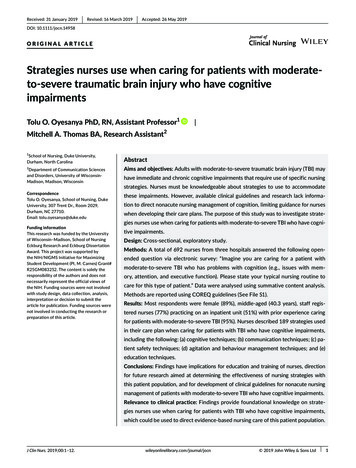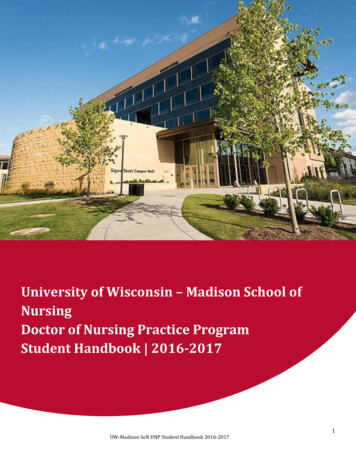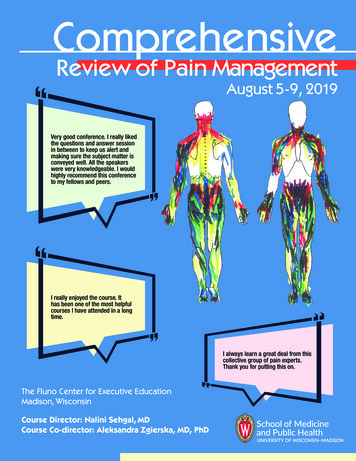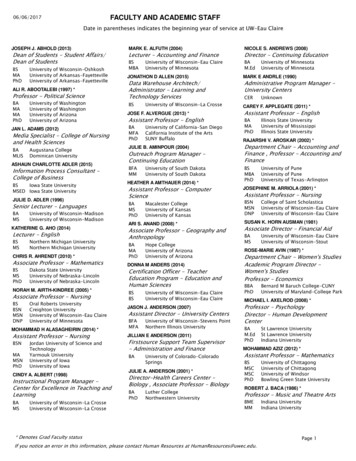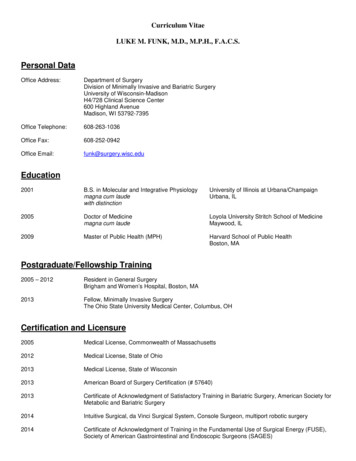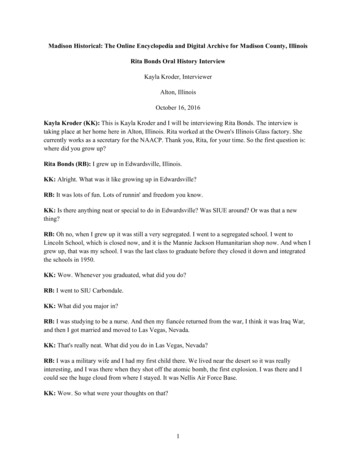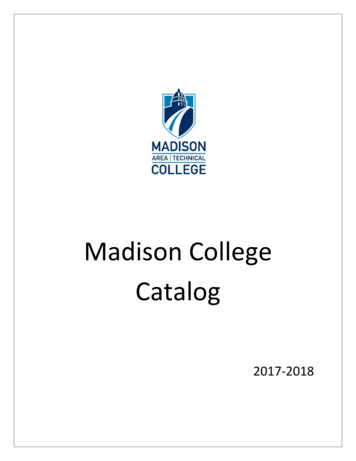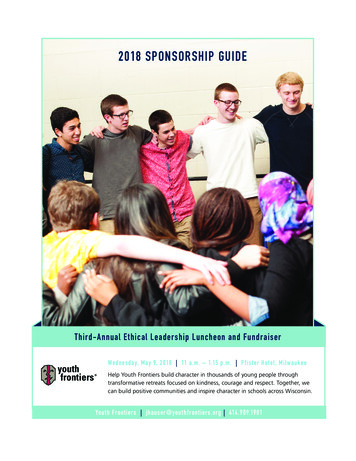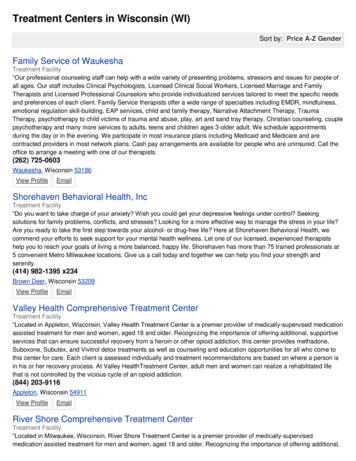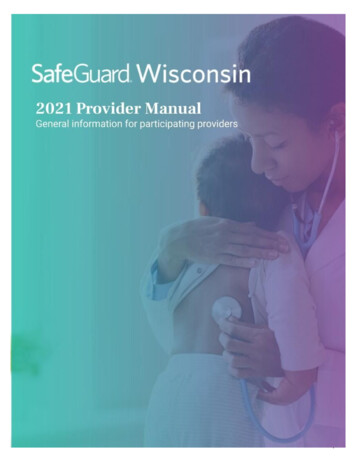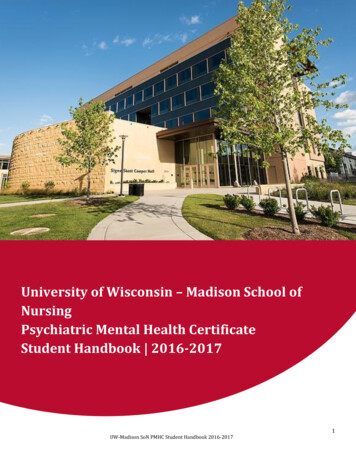
Transcription
University of Wisconsin – Madison School ofNursingPsychiatric Mental Health CertificateStudent Handbook 2016-2017UW-Madison SoN PMHC Student Handbook 2016-20171
Table of ContentsUNIVERSITY OF WISCONSIN-MADISON AND THE SCHOOL OF NURSINGMISSION STATEMENT AND ACCREDITATIONORGANIZATIONAL STRUCTURESCHOOL OF NURSING DIRECTORYSCHOOL OF NURSING COMMITTEESPMHC PROGRAM OVERVIEWWHAT OUR PROGRAM DOESCLINICAL HOUR COMPLETION POLICYPMHC CURRICULAR REQUIREMENTSCURRICULUM DETAILSCOURSE DELIVERYACADEMIC POLICIES AND PROCEDURESACADEMIC INTEGRITYACADEMIC MISCONDUCTHEALTH COMPLIANCE PROGRAMHEALTH COMPLIANCE REQUIREMENTSHEALTH COMPLIANCE PROCEDURESSATISFACTORY ACADEMIC PROGRESSSTUDENT APPEALS AND GRIEVANCE PROCEDURESSTUDENT EVALUATION OF INSTRUCTIONLEAVE OF ABSENCEWITHDRAWAL FROM THE UNIVERSITYPROCEDURES FOR INJURIES/INCIDENTS OCCURRING DURING CLINICAL ROTATIONSLAPTOP POLICYSOCIAL MEDIA POLICYOFFICIAL COMMUNICATIONNAME CHANGESSUPPORT SERVICES FOR STUDENTSCOMPUTINGADULT STUDENT SERVICES CENTERLIBRARIESMCBURNEY DISABILITY RESOURCE CENTERDEAN OF STUDENTS OFFICEWRITING CENTERFACULTY ADVISINGCOURSE ENROLLMENT PROCEDURETEXTBOOKSUW-Madison SoN PMHC Student Handbook 2016-20172
HEALTH/WELLBEING SERVICESDIVERSITYFACILITY INFORMATIONFINANCIAL AID AND SCHOLARSHIPSUW-Madison SoN PMHC Student Handbook 2016-20173
UNIVERSITY OF WISCONSIN-MADISON AND THE SCHOOL OF NURSINGMISSION STATEMENT AND ACCREDITATIONMission: To prepare leaders who improve human health through nursing science, education, and practice.The University of Wisconsin–Madison School of Nursing, established in 1924, is the leading nursing research institutionin Wisconsin and a crucial part of the state's health care system. As an integral academic partner situated in the healthsciences sector of campus with the School of Medicine and Public Health and the School of Pharmacy, the School ofNursing collaborates with scientists and renowned researchers across the UW–Madison campus, the nation, and theworld. The school's research is translational in nature and grounded in practical application–the work being done has animmediate impact on Wisconsin's communities, hospitals, clinics, schools, and homes.The school has an enrollment of more than 500 students, offering the Bachelor of Science in Nursing (BS), Doctor ofNursing Practice (DNP), and Doctor of Philosophy in Nursing (PhD) degrees.With more than 1 billion in research expenditures in 2009, the University of Wisconsin–Madison is the third largestresearch university in the country. The campus includes 13 academic schools and colleges and enrolls more than 40,000students annually. There are 226 centers and institutes recognized and approved within the university that serve toorganize activities for groups of people to collaborate.The Post Graduate Psychiatric Nursing Certificate program at the University of Wisconsin-Madison is pursuing initialaccreditation by the Commission on Collegiate Nursing Education, One Dupont Circle, NW, Suite 530, Washington, DC20036, (202) 887-6791. Applying for accreditation does not guarantee that accreditation will be granted.The mission of the Academic Programs Student Services Office is to support the student experience from pre-admissionthrough post-graduation and also to assist faculty in curriculum development, implementation, and assessment.Student services include recruitment and admissions, advising and enrollment management, facilitating clinicalexperiences, coordination of scholarships and career services and credentialing.The Academic Programs Student Services Offices are located in suite 1100 Cooper Hall, 701 Highland Avenue.Front Office: Signe Skott Cooper Hall, Suite 1100Office Hours: 8:00am-4:30pm, Monday – FridayEmail: acadprogs@son.wisc.eduPhone: (608) 263-5202Academic Programs Student Services Contact ListSchool of Nursing DirectorySCHOOL OF NURSING COMMITTEESThere are many committees within the School of Nursing. The following two extend membership opportunities tograduate students.Graduate Program CommitteeUW-Madison SoN PMHC Student Handbook 2016-20174
The Graduate Programs Committee (GPC) is a standing committee composed of 6 elected faculty members and variousex officio members responsible for curriculum oversight of the DNP and PhD programs. A PhD student is invited to serveas a student representative on the GPC for one year. It is a great opportunity for a student to have a voice in his/her owneducational experience and to share information with peers. This committee is very important in developing andevaluating the graduate curriculum, a place to voice concerns about processes, and generally learn more about thefunctioning of a graduate program and the governance structure in an academic institution.Equity and Diversity CommitteeThe purpose of the committee is to actualize the School’s commitment to diversity by fostering an inclusive environmentwithin the school that values and supports equity and diversity. This committee is composed of two tenured/tenuretrack faculty members, two instructional academic staff, two non-instructional academic staff, a classified staff member,one undergraduate student and one graduate student. This committee plays an important role in policy review andrecommendations for issues related to faculty, staff, and student recruitment, and fostering an inclusive climate in theSchool of Nursing. Please contact the Chair for more information and how to become involved.PMHC PROGRAM OVERVIEWWHAT OUR PROGRAM DOESThis rigorous program offers three semesters of graduate-level foundational and clinical courses. These courses coverthe assessment and management of common mental health conditions, as well as the complex care needs of personsliving with serious mental illness. Students study current issues in psychiatric nursing with an emphasis on evidencebased care.Clinical course work is directed by clinical professors in collaboration with expert preceptors. Students complete 500clock hours of clinical practice hours.CLINICAL HOUR COMPLETION POLICYThe PMHC program requires 500 advanced practice clinical hours.Students must complete half of the required clinical hours by the Friday of the eighth week of class [N728, N729, N828,N829], which corresponds to the university’s drop deadline and is roughly the midway point of the term. If at least halfof the required clinical hours are not completed by the Friday of the eighth week of class, the student will receive anF/zero for the clinical component of the course. In extreme situations and at the discretion of the course professor, anextension may be granted to allow a student to complete more than half of the clinical hours during the second half ofthe term. In such a case, the clinical component of the course will be graded accordingly. A student seeking thisexception must submit the DNP Petition for Special Consideration to the course professor prior to the Friday of theeighth week of class.PMHC CURRICULAR REQUIREMENTSCURRICULUM DETAILSA minimum of 18 credits are required for the program, which lasts a year and a half (summer-fall-spring-fall). In eachsemester of the Psychiatric Nursing Capstone Certificate program, students take one foundation course and one clinicalcourse. These concurrent courses promote the alignment of theory with practice and the integration of advancepractice across care settings and delivery models. Course work and clinical prepare students in the evidence-basedUW-Madison SoN PMHC Student Handbook 2016-20175
assessment and management of common mental health conditions as well as the complex care needs of persons livingwith serious mental illness.In the first summer of the program, students take a three credit psychopharmacology course. In each of the remainingthree semesters students take five credits per semester, which includes a clinical course. Each week, students spendbetween 20 and 25 hours at their clinical site and working on course assignments such as readings, case studies, andonline discussion boards.The current program of study and course descriptions can be found here.COURSE DELIVERYOur hybrid courses offer the best of both worlds: the convenience of online classes combined with the optimal learningopportunities created in dynamic classroom discussions and case studies. Students should expect to spend one day permonth on campus for scheduled class meetings. Students are able to commute from surrounding areas, and they tell usthey enjoy attending classes on campus because they really get to know their peers and professors. Nursing educationcomparison studies of traditional programs and online programs have found improved learning outcomes and reducedstudent attrition in blended on-line and on-campus learning programs.ACADEMIC POLICIES AND PROCEDURESDIVISION OF CONTINUING STUDIES POLICIES AND PROCEDURESPMHC students are responsible for abiding by all Continuing Studies policies and procedures in addition to School ofNursing policies and procedures.ACADEMIC INTEGRITYAcademic Integrity is critical to the mission of the University of Wisconsin-Madison, a research one institution with highacademic standards and rigor. All members of the University community play a role in fostering an environment in whichstudent learning is achieved in a fair, just and honest way. Faculty and instructional staff set the tone in their classroomsby communicating clear expectations to their students and educating them on the consequences of engaging inacademic misconduct while referring to campus resources. Students are expected to uphold the core values of academicintegrity which include honesty, trust, fairness, respect and responsibility. These core values, combined with findingone’s purpose and passion and applying them in and out of classroom learning, produce students who becomeextraordinary citizens. This unique path of opportunities, created by each student, is commonly known as the WisconsinExperience and impacts our campus community and beyond in significant and positive ways. The value of a University ofWisconsin-Madison degree depends on the commitment of our academic community to promote high levels of personalhonesty and respect for the intellectual property of others.ACADEMIC MISCONDUCTAcademic misconduct is governed by state law, UWS Chapter 14 (PDF)Misconduct includes the following, but is not limited to this list: Seeks to claim credit for the work or efforts of another without authorization or citation (plagiarism)UW-Madison SoN PMHC Student Handbook 2016-20176
Uses unauthorized materials or fabricated data in any academic exercise (using notes for a closed-book onlineexam)Forges or falsifies academic documents or records (having a friend sign you in for attendance when you’reabsent)Intentionally impedes or damages the academic work of others (tampering with another student’s experiment)Engages in conduct aimed at making false representation of a student’s academic performance (altering testanswers and submitting the test for regrading)Assists other students in any of these actsAcademic Misconduct ProcessThe University of Wisconsin-Madison takes academic misconduct allegations very seriously. If an instructor suspects astudent has engaged in academic misconduct, then the instructor will contact the student and ask him/her to explaintheir work. If the instructor still believes academic misconduct occurred after meeting with the student, he/she willdetermine the consequences, known as sanctions. One or multiple sanctions may be imposed. Types of sanctionsinclude an oral reprimand up to expulsion. If the sanction affects any grade, the student will then be notified in writing,typically by email, of the instructor’s decision. The Office of Student Conduct & Community Standards (OSCCS) is alsoinformed and will contact the student about his/her rights and any additional sanctions. In most cases, OSCCS willrequire a student to complete an online tutorial on academic integrity, known as the RAISE program. Repeated acts ofacademic misconduct or extreme circumstances may result in more serious actions such as probation, suspension, orexpulsion. A detailed flowchart outlining the process can be found here.HEALTH COMPLIANCE PROGRAMThe School of Nursing is committed to ensuring all nursing students are compliant with national and state guidelines forpersonnel providing nursing care, as well as additional/specific requirements mandated by the school’s clinical affiliatesas set forth in the clinical affiliation agreements. Therefore all nursing students are required to be in full adherence tothe school’s compliance program while enrolled in the nursing program.The school’s compliance program includes immunizations, trainings, and a background check. Students will be heldaccountable for complying with the clinical eligibility requirements prior to entering the program and throughout theirprogram of study. All students are required to keep their compliance documents up to date as an essential part of theirprofessional responsibility for patient safety.CastleBranch Compliance Tracking SolutionTo better serve our students, the School of Nursing partners with CastleBranch to manage student health compliancedocuments. This management system allows students to order their own background checks online and store allrequired documentation. There is a one-time Castle Branch subscription fee that is paid by the student, as well as a costfor the background check.Consequences of Non-ComplianceStudents who are not in compliance as of the first day of the semester, or who fall out of compliance during thesemester, are not allowed to participate in classroom or clinical experiences, including practicum or researchexperiences in a clinical or other care setting.Out-of-compliance students will receive an email barring them from participating in any/all course work; the relevantcourse professor(s) will receive a copy of the email. Students may return to classes once they complete the compliancerequirement(s) or are able to provide evidence of a future appointment/registration to update the immunization ortraining requirement (e.g., CPR course registration). Students may return to clinical settings (including practicum orUW-Madison SoN PMHC Student Handbook 2016-20177
research experiences) only after the appropriate immunization or training has been completed and the documentationsubmitted.Students who are out of compliance will have a hold placed on their university record, which will suspend the student’sability to add or drop courses or enroll for future semesters; the hold will be lifted once the student is in compliance.Questions on the compliance program should be directed to grad compliance@son.wisc.eduHEALTH COMPLIANCE REQUIREMENTSThe School of Nursing requires all nursing students to be compliant with the following requirements. Detailedinformation about each requirement is available on the Castlebranch web site located under your profile To-Do list. Ifyou have any questions about what documentation is required, you should contact the Castle Branch Service Desk at(888)-723-4263 or email Servicedesk.cu@castlebranch.com.Immunizations: Tuberculosis (TB)- renew annuallyHepatitis B seriesMeasles, Mumps and Rubella (MMR)Varicella (Chicken Pox)Tetanus, Diphtheria and Pertussis (Tdap)- Tdap is given one time only as an adult (age 18 and older). After thatonly TD (tetanus/diphtheria) is given every 10 yearsSeasonal Influenza Vaccine - renew annually during current flu season (October - March)Training Requirements: Cardiopulmonary Resuscitation (CPR) Training - Basic Face-To-Face Class initially - renew every two yearsBloodborne Pathogen Training (OSHA or Safety and Infection Control training)- renew annuallyHealth Insurance Portability & Accountability Act (HIPAA) Training - renew annuallySocial Media - one time trainingBackground CheckThe background check is good for 4-year* and includes the following: Wisconsin Department of JusticeResidency HistoryWisconsin Department of Health and Family ServicesNationwide Sexual Offender & Predator RegistryNationwide Healthcare Fraud & Abuse ScanOut of State County Criminal Records*If there is any change in the individual's background while enrolled in the program that results in a change of thecaregiver report, it is the responsibility of the student to notify the School of Nursing and another full background checkis required.HEALTH COMPLIANCE PROCEDURESUW-Madison SoN PMHC Student Handbook 2016-20178
Effective April 1, 2015, the School of Nursing (SoN) has contracted with CastleBranch, Inc. (CB) to maintain compliancerecords (confidentiality statement, record of HIPAA training, etc) and monitor student compliance. CB providesbackground screening and immunization record tracking solutions for more than 1,600 schools nationwide.Student advantages of using CB: Student portal-users have unlimited lifetime access to their recordsElectronic access to immunization records (no need to contact the school for copies of documentation)Students have the ability to share these documents (example: a clinical agency needs documentation of certainimmunizations, create a pdf of what is needed and send the agency a copy no more handling paper copies)CP is more than an immunization tracker. Students can store reference letters, create resume(s) and track wherethey have applied to name a few additional resourcesProvides a private, secure document centerWhat does this mean for students newly admitted to the School of Nursing?1. All new admits will receive information about setting up a Student Profile through CB. Students will be requiredto pay a one-time set-up fee prior to setting up their account. Students must establish their account by July 1,2015.2. If a new admit already has an account with CB, just place an order to be in the School of Nursing SoN programusing the code provided by the school. The program will add the account to the student’s current profilepreviously established as long as the student logs in using their original user name and password. The School ofNursing compliance requirements will be added to the student’s To Do List.SATISFACTORY ACADEMIC PROGRESSCriteria and Procedures for Monitoring Satisfactory Academic ProgressSuccessful completion of courses must be in compliance with guidelines for satisfactory academic progress. In general,PhD students must maintain a minimum GPA of 3.00 in graduate level courses; with a grade of “S” or “P” in all nongraded courses. A student may not receive more than one grade below a “B” in any 12 month period.School of Nursing Progression Criteria:1. Grade Criteriaa. A student may not receive more than one grade below a B (or a “U” grade) in any 12 month period.b. If a student receives a grade below a BC in a required nursing course, the student must repeat thecourse and earn a B or higher.c. Failure to meet the Graduate School or School of Nursing academic progression criteria will place astudent in a state of unsatisfactory progress. Deficiencies must be resolved by the end of the 12 monthperiod following the student being placed in a state of unsatisfactory progress.2. Registration Criteriaa. PhD students must be enrolled for a minimum of 6 credits in the regular semesters (prior to dissertatorstatus).b. DNP students are admitted to a part-time or full-time cohort and are expected to progress with theiradmission cohort.3. Time to DegreeUW-Madison SoN PMHC Student Handbook 2016-20179
a. DNP students must complete the requirements for the Post BS-DNP within 6 years of admission and thePost MS-DNP requirements within 3 years of admission to the program. Upon the advisor’srecommendation, the Associate Dean for Academic Programs may grant a one-year extension.b. PhD students have 5 years from the date of passing their preliminary examination to take their final oralexamination and deposit their dissertation. Failure to complete their degree within this 5 year periodmay result in thei
The Post Graduate Psychiatric Nursing Certificate program at the University of Wisconsin-Madison is pursuing initial accreditation by the Commission on Collegiate Nursing Education, One Dupont Circle, NW, Suite 530, Washington, DC . as a student representative on the GPC for one year. It is
